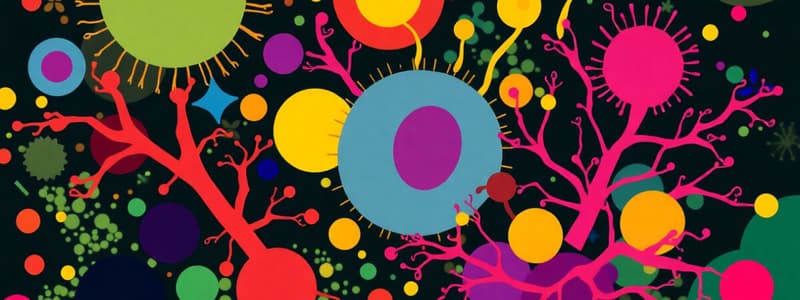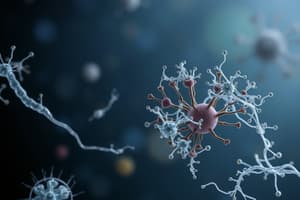Podcast
Questions and Answers
What was the significant byproduct produced by the ancestors of cyanobacteria?
What was the significant byproduct produced by the ancestors of cyanobacteria?
- Nitrogen
- Oxygen (correct)
- Methane
- Hydrogen Sulfide
What do stromatolites represent in the fossil record?
What do stromatolites represent in the fossil record?
- Multicellular organisms from the Ordovician period
- Marine animal fossils
- Fossilized microbial mats (correct)
- Fossilized remains of terrestrial plants
What are the core features of life as described?
What are the core features of life as described?
- metabolism, growth, reproduction (correct)
- cell differentiation, homeostasis, genetic stability
- adaptation, ecosystem interaction, energy production
- reproduction, evolution, nutrient absorption
What is the primary way heterotrophs obtain energy?
What is the primary way heterotrophs obtain energy?
What does the endosymbiotic theory suggest about the origin of eukaryotes?
What does the endosymbiotic theory suggest about the origin of eukaryotes?
Which types of RNA are involved in the process of protein synthesis?
Which types of RNA are involved in the process of protein synthesis?
Which process do microbes use to produce ATP from organic molecules?
Which process do microbes use to produce ATP from organic molecules?
Which of the following accurately describes the arrangement of life forms according to the phylogenetic tree?
Which of the following accurately describes the arrangement of life forms according to the phylogenetic tree?
What perspective involves examining the effects of single mutations in DNA?
What perspective involves examining the effects of single mutations in DNA?
What role do microbes play in biogeochemical cycling?
What role do microbes play in biogeochemical cycling?
What primary role does microbiology serve in relation to molecular biology and biotechnology?
What primary role does microbiology serve in relation to molecular biology and biotechnology?
Who was responsible for the first description of bacteria through lens improvements?
Who was responsible for the first description of bacteria through lens improvements?
Why is the study of microorganisms fundamental to understanding the biosphere?
Why is the study of microorganisms fundamental to understanding the biosphere?
Which of the following characteristics make microorganisms easier to study compared to multicellular organisms?
Which of the following characteristics make microorganisms easier to study compared to multicellular organisms?
What percentage of Earth's biomass is made up of microorganisms?
What percentage of Earth's biomass is made up of microorganisms?
What was one of Robert Hooke's contributions to microbiology?
What was one of Robert Hooke's contributions to microbiology?
What is a significant benefit of studying the genetics of microbes?
What is a significant benefit of studying the genetics of microbes?
What was one of the key insights derived from studying microorganisms about the origins of life on Earth?
What was one of the key insights derived from studying microorganisms about the origins of life on Earth?
What characterizes viruses in terms of their ability to replicate?
What characterizes viruses in terms of their ability to replicate?
Which of the following was a significant finding of Stanley Miller's experiment?
Which of the following was a significant finding of Stanley Miller's experiment?
What does the phylogenetic tree categorize life into based on?
What does the phylogenetic tree categorize life into based on?
Which of the following is NOT a requirement for early life?
Which of the following is NOT a requirement for early life?
What is a significant property of ribozymes?
What is a significant property of ribozymes?
What is indicated about early Earth's atmosphere?
What is indicated about early Earth's atmosphere?
What might micelles have represented in the context of early life?
What might micelles have represented in the context of early life?
What is a key advantage of double-stranded DNA compared to RNA?
What is a key advantage of double-stranded DNA compared to RNA?
What was one of Louis Pasteur's significant contributions to microbiology?
What was one of Louis Pasteur's significant contributions to microbiology?
Which disease was identified as caused by Helicobacter pylori through Koch's postulates?
Which disease was identified as caused by Helicobacter pylori through Koch's postulates?
What historical belief about disease causation existed before the understanding of microbes?
What historical belief about disease causation existed before the understanding of microbes?
What did Robert Koch establish that is essential for linking specific microbes to specific diseases?
What did Robert Koch establish that is essential for linking specific microbes to specific diseases?
Which of the following microbes was determined as the cause of tuberculosis?
Which of the following microbes was determined as the cause of tuberculosis?
Which of the following accurately describes Koch's postulates?
Which of the following accurately describes Koch's postulates?
What impact did the bubonic plague, also known as the Black Death, have on human populations?
What impact did the bubonic plague, also known as the Black Death, have on human populations?
What was one of the outcomes of Louis Pasteur's work on fermentation?
What was one of the outcomes of Louis Pasteur's work on fermentation?
Study Notes
Microbiology
- Study of microbes
- Examines how microbes interact with humans, food, and industrial use
- Foundation of molecular biology and biotechnology
- Microbe definition: any microscopic organism
Microbial Classification
- Prokaryotic cells: Lack a nucleus and membrane-bound organelles
- Eukaryotic cells: Possess a nucleus and membrane-bound organelles
Historical Roots of Microbiology
- Robert Hooke: First described microbes using early microscopes.
- Antonie van Leeuwenhoek: First described bacteria using improved lenses.
Why Study Microbiology
- Microbes were the first life, establishing conditions for multicellular organisms, including oxygen production.
- Over 50% of Earth's biomass is microbial and will persist long after human existence.
- Our understanding of life, from evolution to biochemistry, stems largely from microbial research.
- Microbes are fast, cheap, and simple to grow, making them ideal for research:
- Producing enzymes and molecules for industry and medicine
- Simpler genetic makeup compared to complex organisms
- Easier genetic manipulation in single-celled bacteria
Microbial Applications
- Studying microbial genetics assists in harnessing microbes for human benefit.
- Mass production of molecules
Microbial Ecology
- Microbes play a crucial role in biogeochemical cycling.
- Microbe interactions form diverse communities and ecosystems.
Core Features of Life
- Metabolism: Chemical reactions for energy and growth
- Growth: Increase in size and cell number.
- Reproduction: Generating offspring
- Genetic Variation/Evolution: Changes in genetic makeup over time
- Response/Adaptation: Adjusting to environmental conditions
- Homeostasis: Maintaining internal stability
How Microbes Get Energy
- Heterotrophs: Obtain energy from consuming organic molecules.
- Autotrophs: Generate organic molecules from inorganic sources.
Energy Acquisition
- Microbes break down organic molecules to harness chemical energy (ATP) through:
- Fermentation
- Aerobic respiration
Microbial Communities
- Microbes live in diverse groups.
- Many different microbial populations form communities and ecosystems.
Phylogenetic Tree
- The tree of life is broadly divided into three domains based on ribosomal RNA sequences:
- Eukarya
- Archaea
- Bacteria
Origin of Life
- Early Earth was harsh, characterized by:
- Little oxygen
- High temperatures
- High CO2
- Reducing atmosphere
- First organic molecules formed from primordial soup.
First Life Molecules
- Stanley Miller and Harold Urey's experiment in the 1950s simulated the conditions for early organic molecule formation.
Requirements for Early Life
- Genetic information storage
- Biocatalyst for biochemical reactions
- Membrane separation from the external environment.
Ribozymes
- RNA molecules acting as enzymes
- Catalyze reactions
- Store genetic information
- Self-replicating
Micelles
- Early forms of plasma membranes
RNA World
- RNA was likely the primary form of genetic material before the last universal common ancestor (LUCA).
Double-Stranded DNA
- Provides a backup copy of genetic information
- More stable than RNA
Stromatolites
- Fossilized carbonate pedestals with photosynthetic microbial mats
- Microbial fossil record, indicating dominant life forms for billions of years.
Modern RNA
- DNA is transcribed into mRNA
- mRNA is translated into proteins
- Other RNA types (tRNA, rRNA) play crucial roles in various processes.
Microbial Genetics
- Studying microbes from two perspectives:
- Examining individual mutations effects (microbial genetics)
- Comparing genome pieces across domains (phylogeny)
Origin of Eukaryotes
- Endosymbiotic theory
- Primitive prokaryotic microbes ingested other microbes, forming symbiotic relationships, leading to the first eukaryotic cells.
Microbes and Disease
- Historically, disease was attributed to "bad air" or "angry gods."
- The discovery of microbes led to the belief that they could spontaneously generate from non-living matter.
Louis Pasteur
- Discovered living organisms discriminate between optical isomers.
- Explained biological nature of alcoholic fermentation.
- Developed vaccines for anthrax, fowl cholera, and rabies.
- Developed pasteurization.
- Introduced sanitization in hospitals.
- Disproved spontaneous generation and developed methods for controlling microbial growth.
Robert Koch
- Determined Bacillus anthracis caused anthrax and Mycobacterium caused tuberculosis.
- Established Koch's postulates for determining the cause of a disease.
Koch's Postulates
- Proving a specific microbe causes a specific disease:
- Microbe found in all cases of the disease, but not in healthy individuals.
- Pure culture of the microbe must be obtained.
- Inoculating a healthy host with the microbe causes the same disease.
- The microbe must be recovered from the inoculated host.
Koch's Postulates in Action
- Helicobacter pylori was identified as the cause of stomach ulcers using Koch's postulates.
Microbial Diseases and Humanity
- Bubonic plague ("Black Death") in the 1300s
- European diseases introduced to native populations during exploration of the Americas in the 1500s-1600s
- Spanish flu (H1N1) in the early 1900s
Twentieth Century Trends
- Dramatic reduction in infectious disease deaths.
Studying That Suits You
Use AI to generate personalized quizzes and flashcards to suit your learning preferences.
Related Documents
Description
Explore the fundamental concepts of microbiology, including the classification of microbes into prokaryotic and eukaryotic cells. Discover the historical roots of the field through the contributions of pioneers like Robert Hooke and Antonie van Leeuwenhoek. Understand the importance of microbes in evolution, ecology, and biotechnology.




